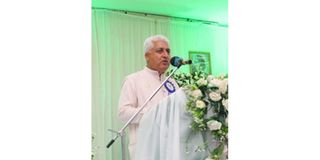Pakistan calls for peaceful dialogue with India for regional stability

Tanzania–Pakistan Business Council chairman, Mr Ghazi Naeemullah, speaks to The Citizen recently about the need to end the threat of war in South Asia through peaceful dialogue. PHOTO | COURTESY
What you need to know:
- Tensions between India and Pakistan, particularly over the disputed Kashmir region, continue to threaten regional stability.
Dar es Salaam. Pakistan has called on India to engage in dialogue and establish joint forums to peacefully resolve longstanding disputes, foster regional peace, and enhance living standards across South Asia.
The chairman of the Tanzania–Pakistan Business Council, Mr Ghazi Naeemullah, said in a statement issued on Friday, May 2, 2025, that both countries must now prioritise the real war against poverty, illiteracy, and poor healthcare rather than viewing each other as enemies.
“We must remember that a legacy of hostility will rob future generations of their dreams. The only true path to peace, prosperity, and development lies in dialogue and compromise,” he said.
Mr Naeemullah, who also heads the Pakistan Welfare Association, underscored the need for responsible leadership from both countries.
He called on India and Pakistan to demonstrate statesmanship by sitting at the table, forming joint platforms, and resolving disputes amicably.
“The billions spent on defence must instead be channelled into regional development and public welfare to uplift living standards,” he urged.
He warned that history has shown war only brings devastation, describing it as a force that “annihilates economies, tears apart societies, and razes civilisations to the ground.”
“The global consequences of war are far-reaching - refugee crises, food insecurity, economic collapse, and long-term instability. South Asia cannot afford such a future,” he said.
Tensions between India and Pakistan, particularly over the disputed Kashmir region, continue to threaten regional stability.
The two nations have fought multiple wars, and periodic border clashes still fuel insecurity.
Mr Naeemullah noted that Pakistan has repeatedly taken steps toward peace, including unilateral ceasefires, initiating dialogue, launching confidence-building initiatives such as the Kartarpur Corridor, and efforts to resolve the Kashmir issue through United Nations mechanisms.
He said the UN has played a role through resolutions, observer deployments along the Line of Control, and repeated calls for bilateral engagement — though regional and global interests have sometimes worked against progress.
“The evolving balance of power in the region is concerning. Both countries are nuclear-armed. Any war would result in catastrophic destruction on both sides, with no true victor,” he cautioned.
He warned that even minor incidents have the potential to escalate into full-scale conflict.
“The devastation would be unimaginable — millions could perish, economies would collapse, and the region could be plunged into global isolation,” he cautioned.
Mr Naeemullah urged both governments to abandon the path of confrontation and pursue wisdom, diplomacy, and cooperation instead.
“War offers no solutions; it only brings ruin. Both nations must resist regional conspiracies and pursue mutual understanding and peaceful engagement,” he stressed.
He concluded by saying that the future of South Asia depends on wise leadership, mutual respect, and a shared vision for peace and prosperity.




